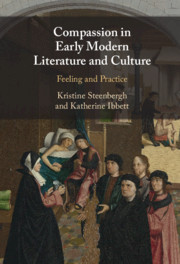Book contents
- Compassion in Early Modern Literature and Culture
- Compassion in Early Modern Literature and Culture
- Copyright page
- Contents
- Acknowledgements
- Contributors
- Introduction
- Part I Theorising
- Part II Consoling
- Chapter 3 ‘Hee Left Them Not Comfortlesse By the Way’
- Chapter 4 Friendship, Counsel and Compassion in Early Modern Medical Thought
- Part III Exhorting
- Part IV Performing
- Part V Responding
- Part VI Giving
- Part VII Racialising
- Part VIII Contemporary Compassions
- Index
Chapter 3 - ‘Hee Left Them Not Comfortlesse By the Way’
Grief and Compassion in Early Modern English Consolatory Culture
from Part II - Consoling
Published online by Cambridge University Press: 23 April 2021
- Compassion in Early Modern Literature and Culture
- Compassion in Early Modern Literature and Culture
- Copyright page
- Contents
- Acknowledgements
- Contributors
- Introduction
- Part I Theorising
- Part II Consoling
- Chapter 3 ‘Hee Left Them Not Comfortlesse By the Way’
- Chapter 4 Friendship, Counsel and Compassion in Early Modern Medical Thought
- Part III Exhorting
- Part IV Performing
- Part V Responding
- Part VI Giving
- Part VII Racialising
- Part VIII Contemporary Compassions
- Index
Summary
After performing ritual gestures of mourning, Job’s friends sat with him in silence for seven days and seven nights. They ‘thoght that he wolde not have hearkened to their counsel’, the annotators of the Geneva Bible explained.1 Early modern English culture acknowledged bereavement as a harrowing experience and recognised the challenges consolers faced when trying to offer solace. Overwhelmed by the loss of a loved one, grief-stricken mourners might, like Job, be reluctant to accept the remedies of religion and philosophy. To be sure, those who indulged in excessive sorrow were castigated, but so were consolers when their insistence on faith and reason was felt to betray a lack of sympathy for the bereaved. The fictitious author of an answer letter included in Angel Day’s The English Secretorie, a letter-writing manual published in 1586, pointed out the inefficiency of the consolatory epistle sent to him by his ‘brother’, whose severity, he implied, was ill advised: ‘Follie were it for mee to thinke or you to beleeue, that the pensiue imagination of a thing so neere … coulde with the vehemencie of a fewe specches (more of zeale then equitie deliuered) be sodenly remooued’.2 The multiplication of formal templates for such replies shows that in England as well as on the Continent, consolation came to be perceived as a dialogic exchange.3 Epistolary practice and friendly ‘conversation’ opened up a conceptual space for debating the ethical and rhetorical limits of consolation.4
Keywords
- Type
- Chapter
- Information
- Compassion in Early Modern Literature and CultureFeeling and Practice, pp. 63 - 81Publisher: Cambridge University PressPrint publication year: 2021



